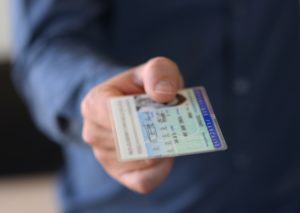Do I Have to Give Police My ID?
In Nevada, you must identify yourself (i.e., give your legal name) when asked by a law enforcement officer, particularly if you are suspected of a crime. However, unless they ask you for your identification at a pullover stop in your vehicle, you do not have to give the officer your ID in all situations.
Because there is a difference between identifying yourself and providing proof of your identity to law enforcement, this article serves to help you better understand your rights in Nevada when a police officer questions you.
U.S. Supreme Court Upholds Nevada Law About Identifying Oneself to Police
 In 2004, the United States Supreme Court ruled in Hiibel v. Sixth Judicial District Court of Nevada, Humboldt County (No. 03-5554) that people in Nevada must comply with the state law that allows police officers to ask for their identification if the officers have reasonable belief to suspect a crime occurred. If an individual refuses to comply, this ruling also allows officers to detain the individual on those grounds, as failure to identify oneself is incriminating.
In 2004, the United States Supreme Court ruled in Hiibel v. Sixth Judicial District Court of Nevada, Humboldt County (No. 03-5554) that people in Nevada must comply with the state law that allows police officers to ask for their identification if the officers have reasonable belief to suspect a crime occurred. If an individual refuses to comply, this ruling also allows officers to detain the individual on those grounds, as failure to identify oneself is incriminating.
“Identifying oneself” under this rule means that you must provide your full legal name. However, this does not mean you have to do anything further, such as give the police your ID card, in many situations. This also applies to immigrants questioned by police officers, meaning they only need to provide their names during questioning. However, Border Patrol and other immigration officers do not always abide by state/local laws and may ask for additional proof of identity.
Understand Your Rights When the Police Approach
So, what situations require you to give police your ID on top of your legal name? Generally speaking, you must give police proof of your identity whenever they pull you over on the road. Nevada law requires drivers to carry driver’s licenses while driving, so police officers have a right to ask for this proof to ensure you are complying with traffic laws. Failure to comply with this request could lead you to face charges.
Regarding your rights, Nevada’s stop-and-identify laws mandate:
- Police officers can only ask for your identity if you are reasonably suspected of a crime.
- You only need to provide your legal name when asked for your identification unless you are pulled over while driving.
- Your constitutional rights allow you to refuse to answer questions beyond your identity at a police traffic stop without the presence of an attorney.
Call De Castroverde Criminal & Immigration Lawyers Today
If a police officer approaches you, you are legally obligated to identify yourself, but this does not mean you have to give the police your ID in all situations. If you are facing charges for not complying with a police officer or another type of crime in Nevada, one of our criminal defense attorneys wants to represent you. We help people in Nevada fight for their rights, and we aim to do the same for you.
You can learn more about our services in a free consultation when you call De Castroverde Criminal & Immigration Lawyers. One of our representatives can discuss what to expect in the criminal justice process, including whether we may be able to have your charges reduced or dismissed.